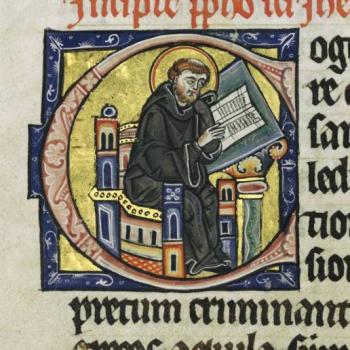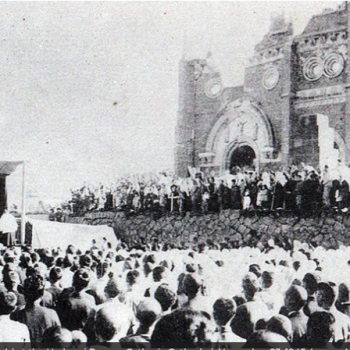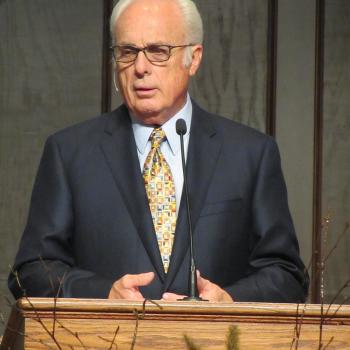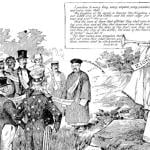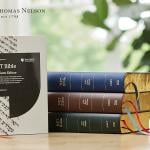“I find myself turning again and again to the imprecatory psalms,” wrote Tish Harrison Warren this week at Christianity Today. “Each morning I’m praying Psalm 7:14–16 with Vladimir Putin in mind: ‘Behold, the wicked man conceives evil and is pregnant with mischief and gives birth to lies. He makes a pit, digging it out, and falls into the hole that he has made. His mischief returns upon his own head, and on his own skull his violence descends’ (ESV).”
Like Warren, “I don’t usually know what to do with” poetry that comes from a source I regard as divinely inspired, perfect, and authoritative, yet “[calls] down destruction, calamity, and God’s judgment on enemies.” Like her, and I’d guess most people who follow Jesus, “I am often uncomfortable with the violence and self-assured righteousness found in these psalms.”
Perhaps even more so than her; I can’t say I’ve been praying imprecations on Vladimir Putin, much as I despise his actions. But I understand her argument that the cursing psalms have value: They “name evil. They remind us that those who have great power are able to destroy the lives of the weak with seeming impunity”; and they give words to our hearts’ longing “for judgment against the wickedness that leaves fathers weeping alone over their silent sons.”
All of which made me wonder just how common it’s been, historically, for American Christians to use the imprecatory psalms.
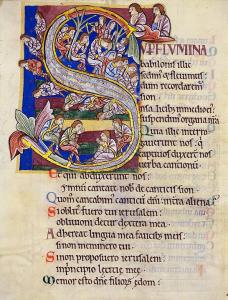
To start to answer that question, I turned again to one of my favorite digital projects: America’s Public Bible. Created in 2016 by historian Lincoln Mullen, APB compiles nearly 900,000 biblical quotations from the King James Bible as they can be found in almost 11 million pages’ worth of American newspaper pages digitized by the Library of Congress in its Chronicling America project. (That collection now extends into the 1960s, but the APB runs from the late 1830s through the early 1920s.)
At his website, Lincoln has made it easy to explore the 1,700 most commonly quoted passages. I couldn’t find a single imprecatory psalm there. So I had to download the entire spreadsheet, delete everything that wasn’t from Psalms, and then start looking for imprecation. There’s debate over what counts as an imprecatory psalm, so I limited myself to psalms in the Wikipedia list and highlighted only those verses that actually called down a curse directly on some target. By those criteria, I wound up with 424 instances from Lincoln’s database.
And some of them aren’t actually imprecatory psalms. While the machine learning model Lincoln created to search the newspaper images is sophisticated, it still identifies false positives. So Psalm 59:13 shows up as a result for this 1902 issue of a Pennsylvania newspaper, but you won’t find anyone calling for God to “consume them in wrath, consume them, that they may not be.” Fortunately, Lincoln’s spreadsheet also includes an estimate of the probability of the search matching the scripture. 275 of my imprecatory results are higher than a 90% likelihood.
Within that narrower set, a few scriptures stood out as being most popular, including Warren’s prayer for Putin. In 1852 a temperance newspaper from Ohio adapted Psalm 7:15 to describe “sellers of strong drink,” or “Soakums,” who “are fallen into the ditch they have made.” Here are the other imprecatory psalms I found cited at least ten times in the APB data:
• Psalm 11:6 • Psalm 12:3-4 • Psalm 35:4-8 • Psalm 69:22-28 • Psalm 83:10-17 • Psalm 137:7-9
That last scripture is particularly troubling, its final three verses a strikingly violent contrast to the heart-wrenching lament of the first six. (“It may seem to savor of cruelty,” allowed John Calvin, before affirming v. 9 as “the declaration of a just judgment…”) So I wondered why and when American newspapers would incorporate comparisons to the “daughter of Babylon” and calls for cities to be razed and children to be dashed against the stones.
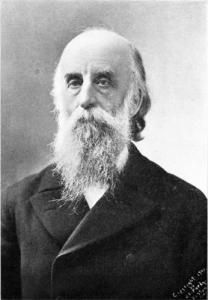
Not surprisingly, some have quoted such imprecation to reject it. For example, this 1892 issue of the Aberdeen (WA) Herald included a review of Lyman Abbott’s The Evolution of Christianity, in which that liberal theologian sought to demonstrate the fallibility of the Bible, with Psalm 137:8-9 exemplifying Abbott’s contrast between “the wrathful and avenging God of the earlier books” and “the loving-kindness of Jesus Christ.” “The whole history of the Jews,” wrote the admiring reviewer, “becomes intelligible” when the mind can be “revolted by the cruelties” of such passages. (Four years later, the Indianapolis Journal reprinted a sermon from Abbott himself, which includes the same verses.) In 1905, multiple newspapers quoted part of an Atlantic Monthly essay by Cornell University founder Andrew Dickson White, who lamented how often 17th century Christians “were devoted not to seeking that peace which was breathed upon the world by the New Testament, but to finding warrant for war… in the Old Testament” — Psalm 137:9, as well as violent episodes from the Torah and 1-2 Samuel.
Indeed, almost all of the allusions to Psalm 137:7-9 that actually celebrated violence — or wished it on someone — came from war or the run-up to war.
Before and after the U.S. entered World War I, Charles Creighton Carlin, a Democratic congressman from Virginia, repeatedly invoked imprecatory psalms to rouse readers of his Alexandria Gazette against Germany. “Dasheth thy little ones against the stones” capped his reports on zeppelins bombing London in both March 1916 and June 1917, and the same verse appears in an October 1918 editorial calling it “but natural that the French and Belgians burn with the desire to enter Germany and inflict damages similar to those caused by the Huns in northern France and Belgium.”
Over half a century earlier, as Sherman’s march continued its merciless progress into South Carolina, a Unionist editor from West Virginia argued that the secessionists’ “impious imprecation has come home upon their own unhallowed heads, and seeing that it has, the loyal millions of these States are ready to take up the righteous indignation of the Psalmist and in the outpourings of their hearts over the fall of Charleston to say with him” the words of Psalm 137.
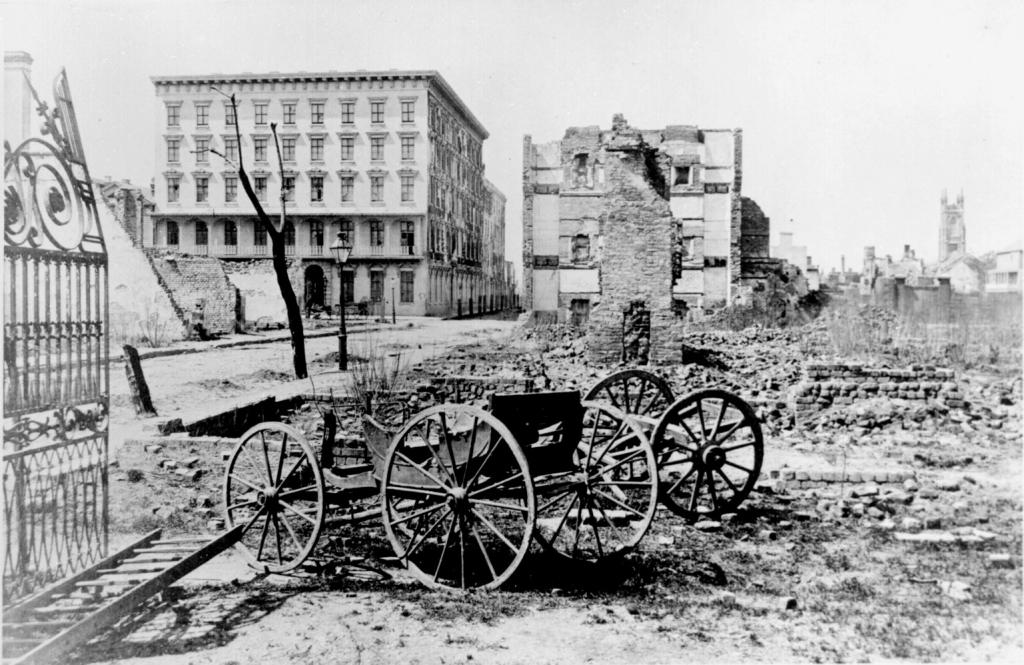
Earlier in the war, Rep. Nehemiah Perry (D-New Jersey) had prayed a different biblical curse, Psalm 5:10, against “the rebels that aimed their daggers at the heart of the nation.” But most of his speech called down condemnation upon Radical Republicans whose attempt to make emancipation a war aim “must indeed be a desperate case that has to pervert passages of Scripture to prop it up.”
Indeed, abolitionists had appealed to imprecatory language even before the Civil War. In the aftermath of the much-reviled Compromise of 1850, for example, The National Era quoted from a 1774 sermon by Nathaniel Niles that recast Psalm 137:8-9 (italicized below) to help white listeners imagine the justifiable anger of enslaved Africans:
What excuse can we make for our conduct? What reason can we urge why our oppression shall not be repaid in kind? Should the Africans see God Almighty subjecting us to all the evils we have brought on them, and should they cry to us, O daughter of America who are to be destroyed, happy shall he be that rewardeth thee as thou hast served us; happy shall he be that taketh and dasheth thy little ones against the stones; how could we object? How could we resent it? Would we enjoy liberty? Then we must grant it to others. For shame, let us either cease to enslave our fellow-men, or else let us cease to complain of those that would enslave us. Let us either wash our hands from blood, or never hope to escape the avenger.
Then a final example, one that reminded me of Warren’s observation that it’s those of us Christians who are privileged to live at a distance from violence and oppression who are more likely to struggle with the imprecatory psalms…
In 1861, an abolitionist paper in Ohio published the account of John Jackson, who escaped slavery in southern Georgia. Quoting freely from Psalms, Jackson closed by telling the story of a friend named Edward — a free man kidnapped from Philadelphia and sold into slavery — who was tortured to death and went
to the world where the servant is free from his master. It was said there was a suit in the court for his freedom. That suit was taken up, where God himself is judge “for the Lord trieth the righteous, but the wicked and him that loveth violence his soul hateth” [Ps 11:5]. He shall “judge the fatherless and the oppressed, that the man of earth may no more oppress” [Ps 10:18]. “Upon the wicked he shall rain snares, fire, and brimstone, and a horrible tempest; this shall be the portion of their cup” [Ps 11:6].



